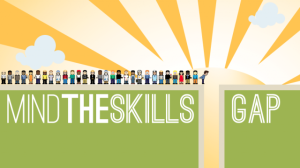11 Feb The future of education: technology (part 1)
Without getting too deep into the politics of developing an effective curriculum and whether or not we should be embracing technology in schools, I’d like to share some thoughts. The rapid development of technology and its uptake by everyone, including children, causes a number of fundamental issues for both the learning process of our school kids but also for the state of the economy in years to come.
Addressing the latter point, refreshingly, I have heard, on numerous occasions, teachers accepting that they are preparing children for jobs that haven’t been invented yet. It is worth think about this concept. Although it seems rather obvious (especially sitting in an office surrounded by full-time social media managers), it does put rather a lot of emphasis on ‘transferable skills’, correct? The fact is, that technology is being developed and embraced so quickly that completely new jobs and even whole industries are springing up every 6 months, let alone 6 years. I am still benefitting from some of the ‘transferable skills’ I picked up from school, but I am having to learn far faster now, than I ever have. How long did it take you to work out how to use your iPhone? Not long, I imagine, since you needed to reconnect to the world and tell Facebook about it as soon as possible. Not much of a feat? Remember, there is more processing power in your iPhone than there was on Apollo 11.
More noticeably than ever, there is a growing disconnect between what children are being taught in schools (and higher education) and what is actually happening in the commercial world – the place where jobs are made. This is manifesting itself in unemployment, a sluggishly growing economy and British-based firms shipping in employees from abroad who have the required skills. This is what is being labelled the ‘skills gap’. There are many complex causes but they are underpinned by a simple concept. The commercial world is driven by profit and demand. Both consumers and companies demand cutting-edge technologies for infinite reasons. Manufacturers, therefore, profit most by providing these technologies and, therefore, require employees with the skills to deliver them. As more and more of the world’s economies become fluent in technology and have the capacity to not only develop, but manufacture these goods, the rate of development is astounding.
Education, on the other hand, is driven by completely different forces. Every student must leave school with basic knowledge and abilities in a range of subjects. We cannot continually change the curriculum based on what skills we require as an economy and what jobs we expect to be around in 2025. The education system is driven by standards and yardsticks. We need to know whether teaching and learning standards are improving and we cannot change more that a couple of variables at a time or we’ll have no idea what’s working and what isn’t. And, of course, there are those transferable skills that we’ll always need, hopefully.
Just throwing it out there (not necessarily representative of my opinion):
How many hours do we spend practising spelling and handwriting? If we were embracing the wonders of word processing and spell-checking, could our time be spent learning things our economy desperately needs? Surely in 20 years time, we won’t be writing a single word on paper – 2 year olds are using iPads before they can speak, let alone write.
What about the monotonous learning of times-tables and long division? When in real life do we not have a device within arms reach that can do this for us? Yes, it’s nice to be able to do it and, yes, it’s lazy to always use your calculator (or, realistically, your phone) but it’s always going to be checked or going into an excel spreadsheet if it’s important, in the real, working world. Does learning our times tables represent a complete waste of time in the 21st century when we could be learning how to programme software, for example?
These are extreme examples but, realistically, these are precisely the skills that are becoming obsolete in our society today. Thoughts welcome! Part 2 coming shortly.





